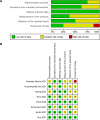Effectiveness of online mindfulness-based interventions in improving mental health during the COVID-19 pandemic: A systematic review and meta-analysis of randomized controlled trials
- PMID: 36129900
- PMCID: PMC9491555
- DOI: 10.1371/journal.pone.0274177
Effectiveness of online mindfulness-based interventions in improving mental health during the COVID-19 pandemic: A systematic review and meta-analysis of randomized controlled trials
Abstract
Introduction: Psychotherapies, such as mindfulness-based interventions (MBIs), are currently needed to tackle mental health problems. Online MBIs have become promising since face-to-face interventions are limited during the COVID-19 pandemic due to lockdown and social distancing. This systematic review and meta-analysis aimed to investigate the effect of online MBIs in improving mental health, mainly depression, anxiety, and stress.
Materials and methods: A systematic literature search was conducted according to the PRISMA 2020 guidelines on several databases for eligible studies up to October 17, 2021. Study quality was assessed using the Cochrane's Risk of Bias 2 tool. Effect sizes were presented as standardized mean difference (Hedges' g) between the online MBIs and control groups at post-test and follow-up using a random-effects model.
Results: Eight randomized controlled trials involving 868 participants were included in this meta-analysis. The pooled adherence rate to online MBIs was 94% (95% CI = 91% to 98%). The findings revealed that online MBIs had a statistically significant small to moderate effect in reducing depression (g = -0.32; 95% CI = -0.49 to -0.14; I2 = 0%), a small effect on anxiety (g = -0.25; 95% CI = -0.43 to -0.06; I2 = 27%), and a moderate effect on stress (g = -0.62; 95% CI = -1.09 to -0.16; I2 = 83%). In addition, significant small effects at follow-up were observed for depression (g = -0.26; 95% CI = -0.48 to -0.04; I2 = 0%) and anxiety (g = -0.28; 95% CI = -0.48 to -0.08; I2 = 0%), but not for stress.
Conclusion: Online MBIs have beneficial effects on mental health, particularly depression, anxiety, and stress, during the COVID-19 pandemic. Given the limitations of the current study, future trials that specifically consider potential effect influencing factors, longer follow-up evaluation, and methodological quality are warranted.
Conflict of interest statement
The authors have declared that no competing interests exist.
Figures





Similar articles
-
Mindfulness-based interventions for improving mental health of frontline healthcare professionals during the COVID-19 pandemic: a systematic review.Syst Rev. 2024 Jun 20;13(1):160. doi: 10.1186/s13643-024-02574-5. Syst Rev. 2024. PMID: 38902795 Free PMC article.
-
New Evidence in the Booming Field of Online Mindfulness: An Updated Meta-analysis of Randomized Controlled Trials.JMIR Ment Health. 2021 Jul 19;8(7):e28168. doi: 10.2196/28168. JMIR Ment Health. 2021. PMID: 34279240 Free PMC article. Review.
-
Effectiveness of online mindfulness-based interventions in improving mental health: A review and meta-analysis of randomised controlled trials.Clin Psychol Rev. 2016 Apr;45:102-14. doi: 10.1016/j.cpr.2016.03.009. Epub 2016 Apr 1. Clin Psychol Rev. 2016. PMID: 27111302 Review.
-
Association of Mindfulness-Based Interventions With Anxiety Severity in Adults With Cancer: A Systematic Review and Meta-analysis.JAMA Netw Open. 2020 Aug 3;3(8):e2012598. doi: 10.1001/jamanetworkopen.2020.12598. JAMA Netw Open. 2020. PMID: 32766801 Free PMC article.
-
Effects of mindfulness-based interventions on psychological outcomes in college and university students during COVID-19 pandemics: A systematic review and meta-analysis.J Clin Psychol. 2023 Sep;79(9):2023-2039. doi: 10.1002/jclp.23526. Epub 2023 Apr 19. J Clin Psychol. 2023. PMID: 37074083
Cited by
-
Cognitive, psychological, and physiological effects of a web-based mindfulness intervention in older adults during the COVID-19 pandemic: an open study.BMC Geriatr. 2024 Feb 14;24(1):151. doi: 10.1186/s12877-024-04766-z. BMC Geriatr. 2024. PMID: 38350854 Free PMC article.
-
Process evaluation of PsyCovidApp, a digital tool for mobile devices aimed at protecting the mental health of healthcare professionals during the COVID-19 pandemic: a mixed method study.Front Psychol. 2024 Mar 21;15:1378372. doi: 10.3389/fpsyg.2024.1378372. eCollection 2024. Front Psychol. 2024. PMID: 38577118 Free PMC article.
-
Prevalence and factors associated with general anxiety symptoms severity among older adults registered with the Primary Healthcare Corporation during the COVID-19 pandemic: A cross-sectional study.Qatar Med J. 2023 Aug 8;2023(3):17. doi: 10.5339/qmj.2023.17. eCollection 2023. Qatar Med J. 2023. PMID: 37565048 Free PMC article.
-
Effects of online mindfulness-based interventions (MBIs) on anxiety symptoms in adults: a systematic review and meta-analysis.BMC Complement Med Ther. 2023 Jul 28;23(1):269. doi: 10.1186/s12906-023-04102-9. BMC Complement Med Ther. 2023. PMID: 37507747 Free PMC article.
-
Long-term effects of combined mindfulness intervention and app intervention compared to single interventions during the COVID-19 pandemic: a randomized controlled trial.Front Psychol. 2024 Mar 19;15:1355757. doi: 10.3389/fpsyg.2024.1355757. eCollection 2024. Front Psychol. 2024. PMID: 38566946 Free PMC article.
References
-
- Kaligis F, Indraswari MT, Ismail RI. Stress during COVID-19 pandemic: Mental health condition in Indonesia. Med J Indones. 2020;29: 436–441. doi: 10.13181/mji.bc.204640 - DOI
-
- Santomauro DF, Mantilla Herrera AM, Shadid J, Zheng P, Ashbaugh C, Pigott DM, et al.. Global prevalence and burden of depressive and anxiety disorders in 204 countries and territories in 2020 due to the COVID-19 pandemic. Lancet. 2021;398: 1700–1712. doi: 10.1016/S0140-6736(21)02143-7 - DOI - PMC - PubMed
-
- Chakraborty P, Mittal P, Gupta MS, Yadav S, Arora A. Opinion of students on online education during the COVID-19 pandemic. Hum Behav Emerg Technol. 2021;3: 357–365. doi: 10.1002/hbe2.240 - DOI
-
- Chatterjee I, Chakraborty P. Use of Information Communication Technology by Medical Educators Amid COVID-19 Pandemic and Beyond. J Educ Technol Syst. 2021;49: 310–324. doi: 10.1177/0047239520966996 - DOI
Publication types
MeSH terms
Grants and funding
LinkOut - more resources
Full Text Sources
Medical

